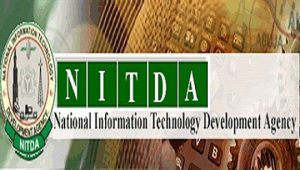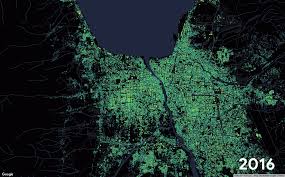E-Business
NITDA, Conduit Pipe to Siphon Money- Pantami
Dr. Isa Ibrahim Pantami, director-general, National Information Technology Development Agency, (NITDA) has accused various government ministries, departments and agencies (MDAs) of manipulating NITDA and lawmakers to siphon money through the budget, annually.
Pantami, pointing at the rot he met at the agency when he assumed office, blamed successive leadership of NITDA for abdicating their responsibilities which cost Nigeria several billions of Naira in losses.
The NITDA boss, spoke when he was honoured as a Friend of the Media, by the Nigerian Union of Journalists (NUJ), at its Press Freedom Awards 2018.
He said the agency throughout its history never regulated Information Technology (IT), in the country, even as that forms one of the core mandates of the agency.
He said it has been manipulated by various government ministries, departments and agencies to siphon money through the budget, annually.
According to him, the MDAs, usually capitalise on the ignorance of the legislators on IT to get such fraudulent budget estimates passed when in the true sense of it, there was no clearance for such IT projects as stated in the budgets.
However, he said on his arrival, such leakages have been blocked with IT Clearance policy now made mandatory for all MDAs.
This, he said, had led to the saving of about N10 billion for the country in two years of his administration.

“Before I came on board, NITDA had been established since 2001 and I joined the agency in 2016. Throughout the history, there was no time that the IT sector was regulated by it.
“It is only when I came on board that I discovered that we need to regulate IT in the country. And the first thing we started doing was to ensure that all IT projects in the MDAs are cleared, technically and professionally executed because before I came on board, many MDAs see IT projects as a conduit for siphoning money. When they go for budget defence, most of our legislators do not know what IT is all about. So, people find it easy to manipulate them and the budget passed without the necessary questions.
“With this IT clearance, huge amount of money has been saved, about N10bn so far, in addition to technical values added.”
Also speaking, Pantami said through this regulation, the administration makes sure it promotes our cybersecurity by creating public awareness about cybersecurity as part of the regulation.
Also on regulation, he stated that NITDA now ensures that local companies, indigenous ICT products are deployed in the MDAs, adding that: “We do not allow importation of IT products unless we discovered we do not have the capacity in the country.
“These are some of the initiatives we have taken, which by implication have been creating digital jobs, supporting our indigenous IT companies, and they are happy. They say the level of patronage as of today is very high compared to before. This is a clear indication that the economy is being supported by this regulation.”
According to the NITDA boss, “MDAs are no more using ICT to syphon money unnecessarily, adding that the entire sleaze may not be completely stopped but has been stopped at least 90% so far
E-Business
NDPC Probes Optasia over Suspected Violation of Data Rights
Dr. Vincent Olatunji, national commissioner, National Data Protection Commission (NDPC), has ordered a full-scale investigation into the data processing activities of Optasia which operates in Nigeria as Nairtime Nigeria Ltd.

The Commission in a statement released by Babatunde Bamigboye, head, Legal, Enforcement & Regulations noted with grave concern that Optasia deploys privacy invading technologies to process personal data for the purposes of marketing, credit scoring and other financial solutions.
“The investigation of credit scoring activities covers the way financial institutions, telecommunication companies, insurance companies among others process personal data of citizens for various purposes,” the commission explained in a statement.
The national commissioner “enjoins data controllers and data processors of major importance who rely on third parties as mediums through which the personal data of the Nigerian populace may be processed to ensure that such third parties are duly registered with the Commission.”
This measure, according to him, “will ensure accountability, strengthen data security architecture and protect Nigeria’s data sovereignty. “
E-Business
NIMC, SecureID Strategise on Advancing Identity Management
SecureID, a smart card manufacturing company, proudly hosted the Director General of the National Identity Management Commission (NIMC), Abisoye Coker-Odusote for an insightful role in Nigeria’s identity management, emphasising the importance of local solutions in tackling Nigeria’s identity management hurdles,

According to Mrs. Kofo Akinkugbe, the Founder and Group CEO of SecureID, “Identity management is an essential social infrastructure worldwide. We firmly believe that home-grown solutions are the most effective ways to overcome the unique challenges we face.”
She also reiterated that through strategic Public-Private Partnerships (PPPs), both the government and the private sector can unlock new opportunities for growth and success in this crucial industry.
The DG of NIMC, Coker-Odusote, discussed the numerous benefits that robust identity management systems bring to the economy.
She also highlighted key accomplishments of the Commission namely enhanced security, increased financial inclusion, improved efficiency in public service and healthcare delivery. She stressed the role of PPPs in accelerating the realization of these benefits.
The DG further commended SecureID, stating that “SecureID’s advanced production technology, alongside its commitment to compliance and quality assurance, is commendable. Their dedication to international standards not only strengthens Nigeria’s position in the global market but also underscores our collective mission of driving secure, reliable identity management solutions.”
As a home-grown company with world-class capabilities, SecureID is well-positioned to offer top-notch services in the identity solutions market. The company’s commitment to quality, innovation, and local content aligns perfectly with Nigeria’s goals for technological advancement and economic diversification.
E-Business
Using AI to Map Africa and Beyond
Did you know that by 2050, the world’s urban population is expected to grow by 2.5 billion, with nearly 90% of that growth happening in cities across Africa and Asia? To keep up with this rapid urbanisation, governments, humanitarian organisations, and researchers need accurate information on buildings and infrastructure.

This data helps plan for future growth, respond to crises, and ensure resources are distributed fairly. But in many parts of Africa and the Global South, this vital information is outdated or simply unavailable.
That’s why Google launched the Open Buildings project in 2021. It started at the AI Research Lab in Accra, Ghana, and has helped map 1.8 billion buildings across Africa, Asia, Latin America, and the Caribbean—about 40% of the globe. This data has been used by governments, NGOs, and researchers to improve services and respond to disasters.
Real-world examples:
In Uganda, the nonprofit Sunbird AI used our data to prioritise areas for rural electrification, ensuring that towns and homes most in need received power first.
WorldPop, a team from the University of Southampton, has integrated the Open Buildings data into their population estimates. These estimates are being used by UN agencies and governments, including in Nigeria, where the data has helped identify areas where children haven’t received routine immunizations.
Now, we’re expanding this effort with the Open Buildings 2.5D Temporal Dataset, which doesn’t just map buildings—it shows how they change over time and estimates their heights. This new data covers the years 2016 to 2023, offering a detailed picture of how cities and settlements across Africa and the Global South have grown. This is crucial for urban planning, disaster response, and understanding population density.
Governments and organisations can use this data in various ways:
Flood preparedness: In flood-prone areas, accurate data can help authorities predict which buildings and neighbourhoods are most at risk.
Urban growth: In cities like Kumasi, Ghana, which has seen rapid expansion, this data allows city planners to better manage resources and infrastructure.
Disaster recovery: In places like Palu, Indonesia, where a tsunami struck in 2018, this data shows how the built environment changed before and after the crisis, helping rebuild communities more effectively.
How we built this dataset:
We used AI to improve the quality of low-resolution satellite images and estimate the size and height of buildings. This is important because higher-resolution satellite images are not always available for the Global South. With this technology, we’ve created a detailed map of over 58 million square kilometres, covering parts of Africa, Latin America, South, and Southeast Asia.
Why this matters:
Maps are a lifeline. They help governments, humanitarian agencies, and researchers ensure that everyone is counted and represented. With this new dataset, we’re giving these organisations better tools to plan for the future, respond to crises, and support communities in need.
We invite researchers, policymakers, and anyone interested in urban development to explore the Open Buildings 2.5D Temporal Dataset on Google Earth Engine and share their feedback with us.

 E-Financial1 day ago
E-Financial1 day agoWilliams, Nigerian gets US Court Nod to Seize $21m from FG’s Account with JP Morgan

 E-Financial1 day ago
E-Financial1 day agoNOVA Bank Announces Appointment of Isiavwe, Iloghalu as Executive Directors

 E-Financial1 day ago
E-Financial1 day agoNaira Joins List of 10 Worst Performing Currencies in the World – Report

 News1 day ago
News1 day agoFintechNGR Unveils Line-up of Local and International speakers for Nigeria Fintech Week 2024

 E-Financial1 day ago
E-Financial1 day agoPalmPay Rolls Out USSD Service to Empower Users with Enhanced Financial Access and Account Security

 E-Financial1 day ago
E-Financial1 day agoFidelity Bank Stock Record over 20 Percent Growth Following Combined Offer

 Telecom1 day ago
Telecom1 day agoPTECSSAN Pickets Huawei over Alleged Poor Working Condition

 News1 day ago
News1 day agoe-Auctioning: Auctioneers Slam EFCC over Alleged Underhand Dealings, Favouritism






















